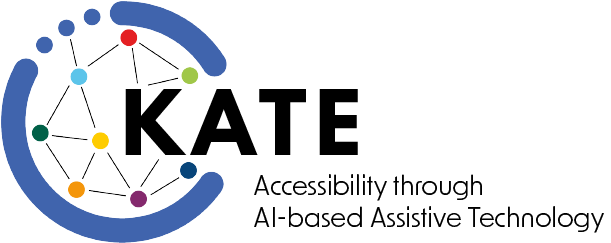Application
Overall Process
The KATE research school currently has planned one election process in the beginning of the graduate school (i.e. end of 2022), and might have some openings later-on. Suitable candidates are selected in a three-step process: (1) the written application, (2) a virtual one-day selection event for short-listed applicants, and (3) matching projects and candidates. Evaluation criteria for the candidates are an excellent academic record and a strong motivation for the interdisciplinary nature of the projects. The institutions are committed to increasing the percentage of female scientists and encouraging female applicants to apply. The next application call is currently out and is open until January 6, 2023.
Please note: The application process is completed.
Requirements
We are looking for excellent graduates holding master’s degrees in computer science, mathematics, engineering, physics, or social sciences.
As an international research school, we require our doctoral researchers to be fluent in English (German is optional). If you are neither a native German nor a native English speaker, a proof of language skills in form of a certificate (IELTS, TOEFL or CAE) or a certified statement that the studies in your previous university degree were taught in English is required.
How to Apply
Please send your application to apply ∂does-not-exist.kate kit edu by January 6, 2023.
Your application should include the following documents:
- a motivation letter
- your CV
- your academic records including Master certificate and transcript of records, Bachelor certificate and transcript of records and High School Certificate.
- an official English translation of your Master and Bachelor transcripts (not needed for German transcripts).
- a proof of English language (such as a TOEFL test), if your are not a native English speaker (can also be submitted later if not at hand).
- The names of two academic references
Finally, please indicate your interest in the currently offered dissertation projects by filling out this form and submitting it with your application.
Living in Karlsruhe
Karlsruhe is an attractive city located in the sunny south-western part of Germany. It is a strong technology region, with great universities, vand a very active start-up environment (Karlsruhe is ranked #3 behind Berlin, and Munich having the most active start-up scene in Germany). It is one of the sunniest cities in Germany and there is much emphasis on culture and art in Karlsruhe. Aside from the renowned and neighboring ZKM, there are many museums, art galleries, street festivals, concerts and a young creative scene. It is located in the Rhine plain with many green zones and lakes in the vicinity. Due to the proximity to the Black Forest and also to France, Karlsruhe is an ideal place to practice different sports such as rowing, swimming, hiking, cycling. Its diverse and vibrant gastronomy and club-scene is not least due to the over 40,000 students from nine universities. Please follow this link for further information about living in Karlsruhe.
More information on living costs can be found in the information pages of the German Academic Exchange Service (DAAD) or from the German Federal Ministry for Education and Research.
Diversity and Equal Opportunities
The provision of equal opportunities and diversity is a central concern of KIT and HKA. We are committed to enabling researchers to balance the demands of career and family life and therefore offer various options to staff, such as flexible working time models, family-friendly meeting times, re-entry after maternity leave, comprehensive childcare concepts, provision of Tele-offices, parent-child offices, and in-house childcare facilities. Funded places in local childcare facilities offer full-time and part-time child-care (for example during a conference or summer school). The networks of female scientists at the partners – “WiKIT” at the KIT and the Center for Equal Opportunities at the HKA – are professional networks of female scientists in leading positions. These networks are platforms of mutual exchange and aim at fostering networking among female scientists of various disciplines to improve the career perspectives and working conditions of female scientists in Germany. All measures promoting the compatibility of career and family life are monitored and advanced by the “familiengerechte Hochschule” (family-friendly university) audit and “Audit Beruf und Familie” (Career and Family Audit) at the KIT and HKA, respectively.

